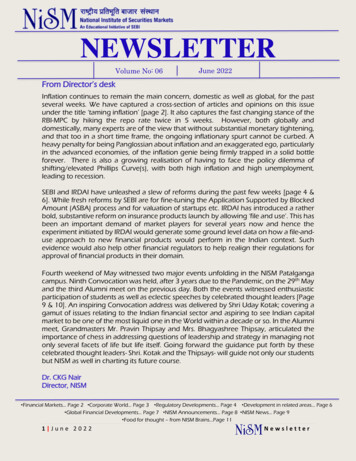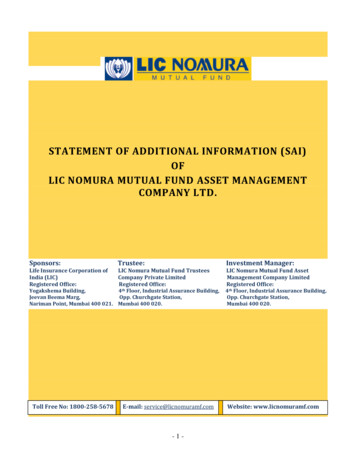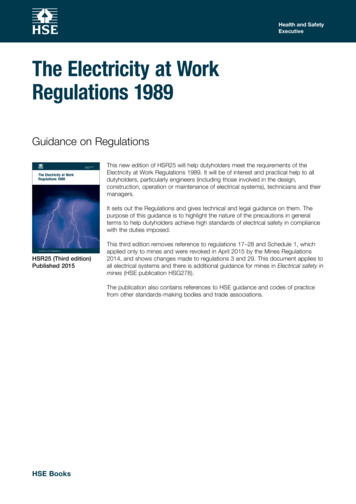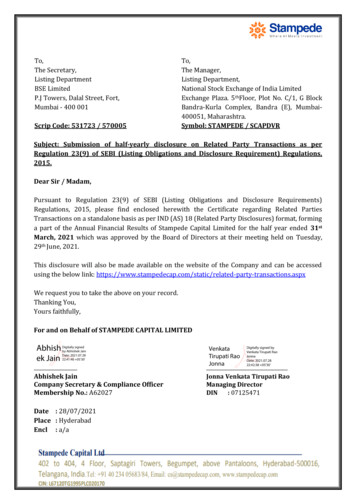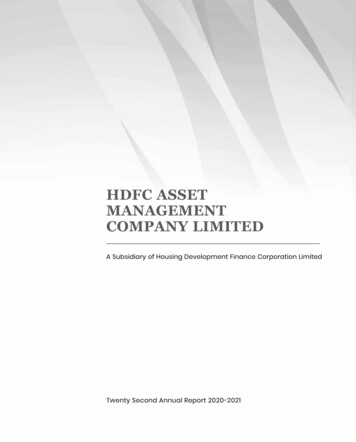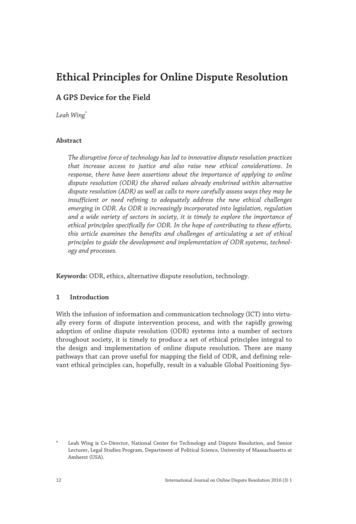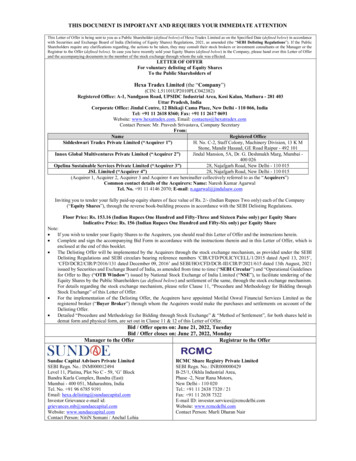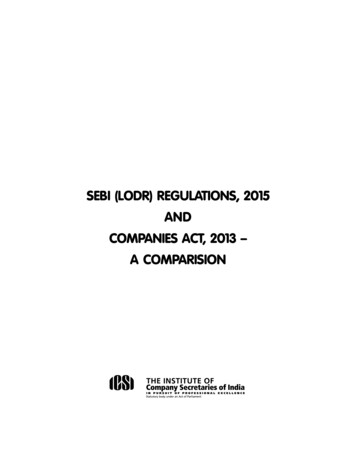
Transcription
SEBI (LODR) REGULATIONS, 2015ANDCOMPANIES ACT, 2013 –A COMPARISION
NOVEMBER 2016Price : Rs. 200/- (Postage extra)DisclaimerAlthough due care and diligence have been taken in the publication ofthis book, the Institute shall not be responsible for and loss or damage,resulting from any action taken on the basis of the contents of thisbook. Any one wishing to act on the basis of the material containedherein should do so after cross checking with the original source. THE INSTITUTE OF COMPANY SECRETARIES OF INDIAAll rights reserved. No part of this Publication may be translated orcopied in any form or by any means without the prior writtenpermission of The Institute of Company Secretaries of India.Published by :THE INSTITUTE OF COMPANY SECRETARIES OF INDIAICSI House, 22, Institutional Area, Lodi Road,New Delhi 110 003Phones : 011-4534 1000, 4150 4444 Fax 91-11-2462 6727E-mail info@icsi.edu Website www.icsi.eduISBN : 978-93-82207-82-5Printed at Chandu Press/500/November 2016(ii)
PREFACEOne of the objective of the SEBI (Listing Obligations and Disclosure Requirements)Regulations, 2015 is to harmonise various provisions of the Listing Agreementwith the Companies Act, 2013. Further, SEBI has consolidated and streamlinedthe provisions of erstwhile Listing Agreements for different segments of the capitalmarket into single Regulation.On a comparative study of these SEBI Listing Regulations with Companies Act2013, one can find that the SEBI Listing Regulations can be classified intoregulations which are in harmony with the Companies Act; which are not inharmony and are substantially different with the Companies Act, 2013.This booklet ‘SEBI (LODR) Regulations 2015 and Companies Act 2013 – AComparison’ is identifying such Regulations and with the detailed commentaryon the compliances required under such Regulations along with the existingcompliance required under the Act. Further, the provisions which are alreadyharmonised and which are not comparable are also substantially dealt with inthis booklet.I commend the dedicated efforts put in by team ICSI led by CS Alka Kapoor, JointSecretary, comprising CS Lakshmi Arun, Joint Director and CS Kalpesh Mehta,Assistant Director in writing the manuscript of this publication.I place on record my sincere thanks to CS Vineet K. Chaudhary, Central CouncilMember and Chairman, Corporate Laws and Governance Committee for hisvaluable inputs. I am also thankful to CS Sriram, Practising Company Secretary forhis valuable inputs in finalising the book.I am confident that the publication will prove to be of immense benefit tocompanies and professional.In any publication, there is always scope for further improvement. I wouldpersonally be grateful to users and readers for offering their suggestions /comments for further refinement.(CS Mamta Binani)PresidentPlace: New DelhiDate : 9th November, 2016The Institute of Company Secretaries of India(iii)
(iv)
ContentsPg. No.Part-AIntroductionPart-BSubstantive additions in SEBI (LODR) Regulations, 2015 inComparison to Companies Act, 2013Chapter IPreliminaryChapter IIPrinciples governing disclosures and obligations of listedentity15Chapter IIICommon obligations of listed entities16Chapter IVObligation of listed entity which has listed its specifiedsecurities2018-808Part-C81-84Chapter VObligations of listed entity which has listed Itsnon-convertible debt securities or con-convertibleredeemable preference shares or both81Chapter VISpecified securities and either non-convertibledebt securities or non-convertible redeemablepreference shares or both82Chapter VIIObligations of listed entity which has listed its Indiandepository receipts83Chapter VIII Obligations of listed entity which has listed Its84securitised debt instrumentsChapter IXObligations of listed entity which has Listed its mutualfund units(v)89
(vi)
INTRODUCTIONThe primary legislation governing companies in India is the Companies Act,2013.In addition, for listed entities, with a view to consolidate and streamline theprovisions of listing agreements for different segments of the capital market andto align the provision relating to listed entities with the Companies Act, 2013, SEBIhas notified the SEBI (Listing Obligations and Disclosure Requirements) Regulations,2015 herein after referred as ‘Listing Regulations’ on September 2, 2015, afterfollowing the consultation process.The Listing Regulations have been structured to provide ease of reference byconsolidating into one single document across various types of securities listedon the Stock exchanges. The entire Regulations have come into force from 1stDecember, 2015.However, there are still areas where there are differences between the ListingRegulations and the Companies Act, 2013.The objective of this book is to classify and analyse some of the salient provisionsof the Regulations and Companies Act, 2013 with respect to the obligations of listedentity which has listed its specified securities, which can be classified into :i. Provisions which are harmonized alreadyii. Provisions which are not comparable between the Regulations and theActiii. Provisions which are substantially different and which are going beyondCompanies Act, 2013A further improved state of affairs from a consolidation perspective and to enablecorporate functionaries and Boards in ensuring compliances with ease wouldhave been to have all the additional provisions which apply to only listed entitiesspecified either under the Companies Act under a separate regulation for listedentities or under the Listing Regulations (with only a reference under the Act thatfor listed entities additional compliances will be as per Listing Regulations) ratherthan having overlapping or duplicate or varying provisions so that there is noambiguity and there is full harmonisation.
2SEBI (LODR) REGULATIONS, 2015 AND COMPANIES ACT, 2013 – A COMPARISIONHowever, till the next stage of harmonisation between the Act and the ListingRegulations is reached it is hoped that this booklet will help in bringing attentionof the practitioners and organisations to the salient differences in compliancerequirements under the Companies Act and Listing Regulations, because it isnecessary for listed entities that the respective provisions under both the Act andthe Regulations be read and implemented in a manner that ensures compliancewith both.This booklet highlights some salient provisions and briefly comments ondifferences or similarities as an aid to bring attention to these aspects. Theexamples herein are not exhaustive and the comments are also not aimed atbringing out all the differences but only salient ones.It is advised that the provisions of the Companies Act and the Listing Regulationsbe always referred to in full and for ensuring respective applicable compliancesexhaustively.Some salient examples of provisions which are harmonised already and whichare not comparable are given below. The provisions which are substantiallydifferent are analysed in a separate chapter.i. Examples of Provisions which are harmonised already harmonised :Essentially here the Regulations rely on or refer to the definitions or coverageunder the Companies Act 2013 and adopt the same meaning or compliancerequirements.Meaning of Financial YearSEBI (LODR)Regulations,20152(1)(i)Financial year shall have the same meaning as assigned to itunder sub-section (41) of section 2 of the Companies Act,2013CompaniesAct, 20132(41) Financial year in relation to any company or bodycorporate, means the period ending on the 31st day of Marchevery year, and where it has been incorporated on or after the1st day of January of a year, the period ending on the 31st dayof March of the following year, in respect whereof financialstatement of the company or body corporate is made up:Provided that on an application made by a company or bodycorporate, which is a holding company or a subsidiary of acompany incorporated outside India and is required to follow
SEBI (LODR) REGULATIONS, 2015 AND COMPANIES ACT, 2013 – A COMPARISION3a different financial year for consolidation of its accountsoutside India, the Tribunal may, if it is satisfied, allow anyperiod as its financial year, whether or not that period is ayear:Provided further that a company or body corporate, existingon the commencement of this Act, shall, within a period oftwo years from such commencement, align its financial yearas per the provisions of this clause.CommentsYes harmonisedIndian depository receiptsSEBI (LODR)Regulations,20152(1)(n)Indian depository receipts means Indian depository receiptsas defined in sub-section(48) of section 2 of the CompaniesAct, 2013CompaniesAct, 20132(48) “Indian Depository Receipt” means any instrument inthe form of a depository receipt created by a domesticdepository in India and authorized by a company incorporatedoutside India making an issue of such depository receipts;CommentsYes harmonisedKey managerial personnelSEBI (LODR)Regulations,20152(1)(o)Key managerial personnel means key managerial personnelas defined in sub-section (51) of section 2 of the CompaniesAct, 2013;CompaniesAct, 20132(51) Key managerial personnel”, in relation to a company,means –(i) the Chief Executive Officer or the managing director orthe manager;(ii) the company secretary;(iii) the whole-time director;(iv) the Chief Financial Officer; and(v) such other officer as may be prescribedCommentsYes harmonised
4SEBI (LODR) REGULATIONS, 2015 AND COMPANIES ACT, 2013 – A COMPARISIONGlobal depository receiptsSEBI (LODR)Regulations,20152(1)(j) Global depository receipts means global depositoryreceipts as defined in sub-section (44) of section 2 of theCompanies Act, 2013CompaniesAct, 20132(44) “Global Depository Receipt” means any instrument inthe form of a depository receipt, by whatever name called,created by a foreign depository outside India and authorizedby a company making an issue of such depository receipts.CommentsYes harmonisedHolding companySEBI (LODR)Regulations,20152(1)(m)Holding company means a holding company as defined insub-section (46) of section 2 of the Companies Act, 2013.CompaniesAct, 20132(46) Holding company in relation to one or more othercompanies, means a company of which such companies aresubsidiary companiesCommentsYes harmonisedNet worthSEBI (LODR)Regulations,20152(1)(s)Net worth means net worth as defined in sub-section (57) ofsection 2 of the Companies Act, 2013CompaniesAct, 20132(57) “Net worth” means the aggregate value of the paid-upshare capital and all reserves created out of the profits andsecurities premium account, after deducting the aggregatevalue of the accumulated losses, deferred expenditure andmiscellaneous expenditure not written off, as per the auditedbalance sheet, but does not include reserves created out ofrevaluation of assets, write-back of depreciation andamalgamationCommentsYes harmonisedRelativeSEBI (LODR)Regulations,20152(1)(zd)Relative means relative as defined under sub-section (77) ofsection 2 of the Companies Act, 2013 and rules prescribedthere under:
SEBI (LODR) REGULATIONS, 2015 AND COMPANIES ACT, 2013 – A COMPARISIONProvided this definition shall not be applicable for the unitsissued by mutual fund which are listed on a recognized stockexchange(s);CompaniesAct, 20132(77) Relative with reference to any person, means any onewho is related to another, if –(i) they are members of a Hindu Undivided Family;(ii) they are husband and wife; or(iii) one person is related to the other in such manner asmay be prescribed;CommentsYes harmonisedIt may be important to point out that while the definition ofRelative has been substantially adopted under the ListingRegulations, the definition of Related Party for the purposes ofRelated Party Transaction is different under the Act and theListing Regulations. This is dealt with under the Chapter onmaterial differences.Stock exchangeSEBI (LODR)Regulations,20152(1)(zk)Stock exchange means a recognized stock exchange asdefined under clause (f) of section 2 of the Securities Contracts(Regulation) Act, 1956;[“recognised stock exchange” means a stock exchange whichis for the time being recognised by the Central Governmentunder section 4;]CompaniesAct, 20132(73) “recognised stock exchange” means a recognised stockexchange as defined in clause (f) of section 2 of the SecuritiesContracts (Regulation) Act, 1956CommentsYes harmonisedii. Examples of Provisions not ComparableThese are provisions where either the Act does not have any comparabledefinition or provision as in Listing Regulations or vice versa. In these situationseither some harmonisation will be desirable or may not be required as theprovisions operate in different fields or apply only to Listed entities.5
6SEBI (LODR) REGULATIONS, 2015 AND COMPANIES ACT, 2013 – A COMPARISIONListing agreementSEBI (LODR)Regulations,20152(1)(q)Listing agreement shall mean an agreement that is enteredinto between a recognized stock exchange and an entity, onthe application of that entity to the recognized stock exchange,undertaking to comply with conditions for listing of designatedsecurities.CompaniesAct, 2013No such definition,Act defines Listed Company under Section 2(52)CommentsNo harmonization requiredMain boardSEBI (LODR)Regulations,20152(1)(r)Main board means main board as defined in clause (a) ofsub-regulation (1) of regulation 106N of the Securities andExchange Board of India (Issue of Capital and DisclosureRequirements) Regulations, 2009:[“Main Board” means a recognized stock exchange havingnationwide trading terminals, other than SME exchange; ]CompaniesAct, 2013No such definitionCommentsNo harmonisation requiredPublic shareholdingSEBI (LODR)Regulations,20152(1)(y)public shareholding means public shareholding as definedunder clause (e) of rule 2 of the Securities Contracts (Regulation)Rules, 1957[As per Rule 2(d) of Securities Contracts (Regulation) Rules,1957“Public shareholding” means equity shares of the companyheld by public and shall exclude shares which are held bycustodian against depository receipts issued overseas.]CompaniesAct, 2013No such definitionCommentsNo harmonization required
SEBI (LODR) REGULATIONS, 2015 AND COMPANIES ACT, 2013 – A COMPARISIONScheduleSEBI (LODR)Regulations,20152(1)(ze)Schedule means a schedule annexed to these regulations.CompaniesAct, 20132(79) “Schedule” means a Schedule annexed to this Act;CommentsNot ComparableSecurities lawsSEBI (LODR)Regulations,20152(1)(zf)Securities laws means the Act, the Securities Contracts(Regulation) Act, 1956, the Depositories Act, 1996, and theprovisions of the Companies Act, 1956 and Companies Act,2013, and the rules, regulations, circulars or guidelines madethereunder.CompaniesAct, 2013No such definitionCommentsNo harmonization requiredSecuritized debt instrumentsSEBI (LODR)Regulations,20152(1)(zg)Securitized debt instruments as defined in the Securities andExchange Board of India (Public Offer and Listing of SecuritizedDebt Instruments) Regulations, 2008[As per Regulation 2(s) of Securities and Exchange Board ofIndia (Public Offer and Listing of Securitized Debt Instruments)Regulations, 2008, “securitised debt instrument” means anycertificate or instrument, by whatever name called, of thenature referred to in sub-clause (ie) of clause (h) of section 2 ofthe Act issued by a special purpose distinct entity;]CompaniesAct, 2013No such definitionCommentsNo harmonization required7
8SEBI (LODR) REGULATIONS, 2015 AND COMPANIES ACT, 2013 – A COMPARISIONSUBSTANTIVE ADDITIONS IN SECURITIES ANDEXCHANGE BOARD OF INDIA (LISTINGOBLIGATIONS AND DISCLOSURE REQUIREMENTS)REGULATIONS, 2015 IN COMPARISION TOTHE COMPANIES ACT, 2013CHAPTER IPRELIMINARYI. AssociateSEBI (LODR)Regulations,2015Regulation 2(1)(b)“Associate” shall mean any entity which is an associate undersub-section (6) of section 2 of the Companies Act, 2013 orunder the applicable accounting standards:Provided that this definition shall not be applicable for theunits issued by mutual fund which are listed on a recognizedstock exchange(s) for which the provisions of the Securitiesand Exchange Board of India (Mutual Funds) Regulations, 1996shall be applicable.[AS-23- An associate is an enterprise in which the investorhas significant influence and which is neither a subsidiarynor a joint venture of the investor.]CompaniesAct, 2013Section 2(6)“Associate company”, in relation to another company, meansa company in which that other company has a significantinfluence, but which is not a subsidiary company of thecompany having such influence and includes a joint venturecompany.CommentsThe Regulation defines the word “Associates” which is widerin comparison to the term “Associate Company” defined underCompanies Act, 2013, as it covers the meaning of associateunder the Accounting standards also.
SEBI (LODR) REGULATIONS, 2015 AND COMPANIES ACT, 2013 – A COMPARISION9II. Chief financial officer or whole time finance director or head offinanceSEBI(LODR)Regulations,2015Regulation 2(1)(f)Chief financial officer or whole time finance director or headof finance by whatever name called, shall mean the personheading and discharging the finance function of the listedentity as disclosed by it to the recognized stock exchange(s)in its filing under these Regulations;CompaniesAct, 2013Section 2(19)“Chief Financial Officer” means a person appointed as theChief Financial Officer of a company.CommentsThe Regulation is more specific as it states that the Head ofFinance or such other person discharging the finance functionand whose name is disclosed to the stock exchange as suchis considered as Chief Financial Officer.III. CommitteeSEBI (LODR)Regulations,2015Regulation 2(1)(g)Committee shall mean committee of board of directors or anyother committee so constituted;CompaniesAct, 2013The term Committee is not defined under Companies Act,2013CommentsThe Regulation covers the any other committee other thanthe Board Committees as well.IV. Designated securities/Specified SecuritiesSEBI (LODR)Regulations,2015Regulation 2(1)(h)The Regulations defines the terms designated securities,specified securities and securitiesDesignated securities means specified securities, nonconvertible debt securities, non-convertible redeemablepreference shares, perpetual debt instrument, perpetual noncumulative preference shares, Indian depository receipts,securitized debt instruments, units issued by mutual fundsand any other securities as may be specified by the Board.
10SEBI (LODR) REGULATIONS, 2015 AND COMPANIES ACT, 2013 – A COMPARISIONRegulation 2(1)(Zl)specified securities‘ means equity shares‘ and convertiblesecurities‘ as defined under clause (zj) of sub-regulation (1) ofregulation 2 of the Securities and Exchange Board of India(Issue of Capital and Disclosure Requirements) Regulations,2009;CompaniesAct, 2013Section 2(81)securities means the securities as defined in clause (h) ofsection 2 of the Securities Contracts (Regulation) Act , 1956.As per section 2 of the Securities Contracts (Regulation) Act,1956: securities” include—shares, scrips, stocks, bonds,debentures, debenture stock or other marketable securitiesof a like nature in or of any incorporated company or otherbody corporate;]CommentsThe definition of designated securities is wider to coverspecified securities also which are equity shares andconvertible securities. The Companies Act 2013 defines theterm securities to be in line with the definition of SecuritiesContracts Regulation Act.The definition of designated securities and specified securitiesin LODR is for the purpose of identifying different compliancesfor equity/convertible securities and debt securities whichare stated in different chapters of LODR Regulations.V. Listed entitySEBI (LODR)Regulations,2015Regulation 2(1)(p)Listed entity means an entity which has listed, on a recognizedstock exchange(s), the designated securities issued by it ordesignated securities issued under schemes managed by it,in accordance with the listing agreement entered into betweenthe entity and the recognized stock exchange(s);CompaniesAct, 2013Section 2(52)listed company means a company which has any of itssecurities listed on any recognized stock exchange;CommentsThe Regulation covers the Listed entity where as the CompanyAct, 2013 refers to listed company. However it may be noted
SEBI (LODR) REGULATIONS, 2015 AND COMPANIES ACT, 2013 – A COMPARISION11that listing of equity shares/debt securities are covered underthe definition of listed entity/listed company as the case maybe, since the definition of designated securities includes debtsecurities.VI. Non convertible debt securitiesSEBI (LODR)Regulations,2015Regulation 2(1)(t)non-convertible debt securities‘ which is debt securities‘ asdefined under regulation 2(1)(e) of the Securities and ExchangeBoard of India (Issue and Listing of Debt Securities) Regulations,2008;CompaniesAct, 2013No definition is provided under the Act.CommentsIt will be important to keep this in view that this term is usedunder the Regulations.VII. Non-convertible Redeemable Preference SharesSEBI (LODR)Regulations,2015Regulation 2(1)(u)non-convertible redeemable preference shares‘, perpetualdebt instrument‘/'innovative perpetual debt instrument' andperpetual non cumulative preference share‘ shall have thesame meaning as assigned to them in the Securities andExchange Board of India (Issue and Listing of Non-ConvertibleRedeemable Preference Shares) Regulations, 2013.CompaniesAct, 2013No definition is provided under the Act.CommentsThe definition under the Regulations is wide. One needs tokeep in view the conditions on issue of preference sharesunder the Companies Act while considering any suchsecurities vis a vis Listing Regulations.VIII. Promoter and Promoter GroupSEBI (LODR)Regulations,2015Regulation 2(1)(w)"promoter" and "promoter group" shall have the same meaningas assigned to them respectively in clauses (za) and (zb) ofsub-regulation (1) of regulation 2 of the Securities and ExchangeBoard of India (Issue of Capital and Disclosure Requirements)Regulations, 2009
12SEBI (LODR) REGULATIONS, 2015 AND COMPANIES ACT, 2013 – A COMPARISIONCompaniesAct, 2013Section 2(69)“promoter” means a person –(a) who has been named as such in a prospectus or isidentified by the company in the annual return referredto in section 92; or(b) who has control over the affairs of the company, directlyor indirectly whether as a shareholder, director orotherwise; or(c) in accordance with whose advice, directions orinstructions the Board of Directors of the company isaccustomed to Act:Provided that nothing in sub-clause (c) shall apply to aperson who is acting merely in a professional capacity;CommentsIn Companies Act only the term Promoter is defined butpromoters group is not defined.IX. Related partySEBI (LODR)Regulations,2015Regulation 2(1)(zb)Related party means a related party as defined under subsection (76) of section 2 of the Companies Act, 2013 or underthe applicable accounting standards:Provided that this definition shall not be applicable for theunits issued by mutual funds which are listed on a recognisedstock exchange(s);[AS-18, Related party - parties are considered to be related ifat any time during the reporting period one party has theability to control the other party or exercise significant influenceover the other party in making financial and/or operatingdecisions.]CompaniesAct, 2013Section 2(76)“Related party”, with reference to a company, means –(i) a director or his relative; (ii) a key managerial personnelor his relative;(iii) a firm, in which a director, manager or his relative is apartner;
SEBI (LODR) REGULATIONS, 2015 AND COMPANIES ACT, 2013 – A COMPARISION13(iv) a private company in which a director or manager orhis relative is a member or director;(v) a public company in which a director or manager is adirector and holds along with his relatives, more thantwo per cent of its paid-up share capital;(vi) any body corporate whose Board of Directors, managingdirector or manager is accustomed to act in accordancewith the advice, directions or instructions of a director ormanager;(vii) any person on whose advice, directions or instructionsa director or manager is accustomed to act:Provided that nothing in sub-clauses (vi) and (vii) shallapply to the advice, directions or instructions given in aprofessional capacity;(viii) any company which is –(A) a holding, subsidiary or an associate company ofsuch company; or(B) a subsidiary of a holding company to which it isalso a subsidiary;(ix) such other person as may be prescribed;CommentsThe Regulations covers the related party by virtue of AccountingStandards also, it will be important to keep this in view thatany clarification/notification issued under the accountingstandards may change the scope of related party of listedentity accordingly.X. Related party transactionSEBI (LODR)Regulations,2015Regulation 2(1)(zc)Related party transaction means a transfer of resources,services or obligations between a listed entity and a relatedparty, regardless of whether a price is charged and a“transaction” with a related party shall be construed to includea single transaction or a group of transactions in a contract:Provided that this definition shall not be applicable for theunits issued by mutual funds which are listed on a recognizedstock exchange(s);
14SEBI (LODR) REGULATIONS, 2015 AND COMPANIES ACT, 2013 – A COMPARISIONCompaniesAct, 2013Section 188(1) Except with the consent of the Board of Directors given by aresolution at a meeting of the Board and subject to suchconditions as may be prescribed, no company shall enterinto any contract or arrangement with a related party withrespect to –(a) sale, purchase or supply of any goods or materials;(b) selling or otherwise disposing of, or buying, property ofany kind;(c) leasing of property of any kind;(d) availing or rendering of any services;(e) appointment of any agent for purchase or sale of goods,materials, services or property;(f) such related party's appointment to any office or placeof profit in the company, its subsidiary company orassociate company; and(g) underwriting the subscription of any securities orderivatives thereof, of the company:CommentsThe term related party transaction is defined under Regulationsin a different manner from the Companies Act, this definitionis more generic and covers the transfer of resources, servicesand obligations regardless of whether a price is charged ornot, where as the Companies Act, 2013 provides for certainspecified transaction only, thus, the definition under the listingregulation is wider than the definition of related partytransaction under the Act, and which needs to be carefullyexamined by the listed company.A key aspect is “arms length basis”. Under the Act if atransaction with a related party is at arms length basis thenthe provisions of section 188 do not apply. However under theRegulations there is no such exemption and it applies to allrelated parties transactions.Therefore, a comprehensive view of accounting standardsand Listing Regulations should be taken with regard to thecompliance & disclosure requirement of Related PartyTransactions.
SEBI (LODR) REGULATIONS, 2015 AND COMPANIES ACT, 2013 – A COMPARISION15CHAPTER IIPRINCIPLES GOVERNING DISCLOSURES ANDOBLIGATIONS OF LISTED ENTITYI. Principles governing disclosures and obligationsSEBI (LODR)Regulations,2015Regulation 4 covers the Principles Governing Disclosures andObligations of Listed Entity Where in the listed entity whichhas listed securities shall make disclosures and abide by itsobligations in accordance with the principles mentioned inthe LODR Regulations:The listed entity need to comply with the corporate governanceprovisions as specified in chapter IV which should beimplemented in a manner so as to achieve the objectives ofthe following principles:(a) The rights of shareholders:(b) Timely information:(c) Equitable treatment(d) Role of stakeholders in corporate governance:(e) Disclosure and transparency:(f) Responsibilities of the board of directors:(i) Disclosure of information(ii) Key functions of the board of directors(iii) Other responsibilitiesCompaniesAct, 2013Section 166 of the Companies Act, 2013 provides for duties ofDirector, further the Schedule IV of Companies Act, 2013provides the Role and functions of Independent DirectorsCommentsThe Regulations provides specifically for compliance toachieve the objective keeping in view of the Rights ofshareholders, which are not directly provided in theCompanies Act, 2013. However, the Companies Act providefor certain situations in which shareholders or a class ofshareholders can take action against the company.
16SEBI (LODR) REGULATIONS, 2015 AND COMPANIES ACT, 2013 – A COMPARISIONCHAPTER IIICOMMON OBLIGATIONS OF LISTED ENTITIESI. Compliance Officer and his ObligationsSEBI (LODR)Regulations,2015Regulation 6A listed entity shall appoint a qualified company secretary asthe compliance officer. The compliance officer of the listedentity shall be responsible for(a) ensuring conformity with the regulatory provisionsapplicable to the listed entity in letter and spirit.(b) co-ordination with and reporting to the Board,recognized stock exchange(s) and depositories withrespect to compliance with rules, Regulations and otherdirectives of these authorities in manner as specifiedfrom time to time.(c) ensuring that the correct procedures have been followedthat would result in the correctness, authenticity andcomprehensiveness of the information, statements andreports filed by the listed entity under these Regulations.(d) monitoring e-mail address of grievance redressaldivision as designated by the listed entity for the purposeof registering complaints by investors:Provided that the requirements of this regulation shall not beapplicable in the case of units issued by mutual funds whichare listed on recognised stock exchange(s) but shall begoverned by the provisions of t
(v ) Contents Pg. No. Part-A Introduction 1 Part-B Substantive additions in SEBI (LODR) Regulations, 2015 in 8-80 Comparison to Companies Act, 2013 Chapter I Preliminary 8 Chapter II Principles governing disclosures and obligations of listed 15 entity Chapter III Common obligations of listed entities 16 Chapter IV Obligation of listed entity which has listed its specified 20


